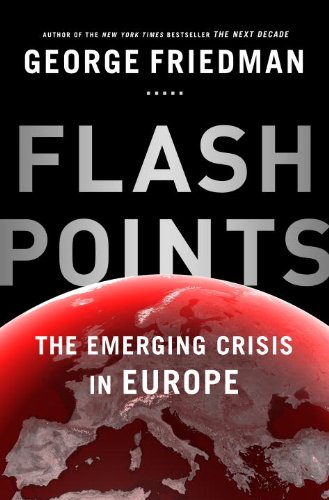Flashpoints
January 29, 2015
Stratfor founder and Chairman George Friedman investigates the intersection of culture and conflict in FLASHPOINTS: The Emerging Crisis in Europe
 Divided into borderlands, Europe is a place where nations, religions, and cultures mingle. Despite its relatively modest size, geography makes European unity difficult. The continent does not consist of a single, undifferentiated landmass, but instead is fragmented and crowded with a diversity of nations and people. As a result, small countries can survive for long periods of time, producing borderlands – divisions that separate the European peninsula from the European Mainland, the West from Russia, and beyond. These borders are locations where cultures meet, but can also be the flashpoints where wars are fought.
Divided into borderlands, Europe is a place where nations, religions, and cultures mingle. Despite its relatively modest size, geography makes European unity difficult. The continent does not consist of a single, undifferentiated landmass, but instead is fragmented and crowded with a diversity of nations and people. As a result, small countries can survive for long periods of time, producing borderlands – divisions that separate the European peninsula from the European Mainland, the West from Russia, and beyond. These borders are locations where cultures meet, but can also be the flashpoints where wars are fought.Despite these divisions, Europe has historically dominated the globe. It's difficult to comprehend the extent to which Europe in 1914 had transformed the very fabric of life throughout the world. Over the previous four hundred years, European nations had collectively conquered most of the planet – and in doing so, reshaped the way most humans conceived of themselves. But following this period of influence and expansion, between 1914 and 1945, roughly one hundred million Europeans perished from internal political causes including war, genocide, purges, and planned starvations. Historically, other civilizations had undergone similar turmoil, war, and savagery – but the unexpectedness, intensity, and rapid consequences for the rest of the planet were uniquely unprecedented.
In Flashpoints: The Emerging Crisis in Europe, George Friedman asks the most important question facing global citizen today – have conflict and war actually been banished from Europe? Or is today's period of comparative peace merely an interlude following the centuries of conflict that preceded it? We are now living through Europe's test and to answer that question, must investigate centuries of European history to discover how today's events will once again impact the rest of the world. Flashpoints offers a clearly explained, riveting look at the history that has led us to this moment, as well as the situations, conflicts, opportunities, and events to come.
George Friedman's impressive track record in forecasting includes successful predictions covering the European financial and political crises, increased Russian aggression in its "Near Abroad," the Arab Spring, and conflict in Syria. Flashpoints continues this tradition of correct calls with new predictions focused on the struggle for Ukraine, the fragmentation of Europe's eastern frontier, hostility in Turkey, and the rise of right wing extremism throughout the continent at large, such as:
- The Ukrainian crisis will open a new phase in the struggle between Russia and the European Peninsula which will last for years and will spread.
- The European Union is failing and will continue to fail. Germany's compulsion to export has created a massive contraction in Europe.
- A powerful, dynamic and insecure Germany defined European politics since unification in 1871. Divided after World War II and then reunited in 1989, Germany is again the defining problem in Europe, and will once again become powerful, dynamic and insecure.
- Nationalism is returning to Europe, and with it, conflict within and between nations.
- The Balkans and the Caucasus saw bloody wars in the 1990s. Since then there have been truces, but the truces will break down.
- The Mediterranean is the border between predominantly Christian Europe and predominantly Muslim North Africa and Turkey. The wave of immigrants from the south has destabilized parts of the North.
- The rise of Turkey as a major regional power will affect the Balkans, Caucasus and Russia. Whatever Turkey's intent, it will destabilize the region and create a new order there. It will not be without violence.
- Britain will avoid the destabilization in Europe by pulling away from the EU and closer to the United States.
- Europe's violent past was not abolished in 1945. It was suspended, and only partially. The basic reality is the same as it was then: a small continent filled with small nations, insecure and with long and bad memories of each other.


